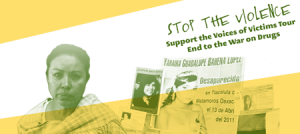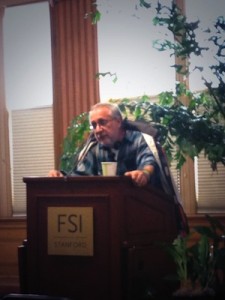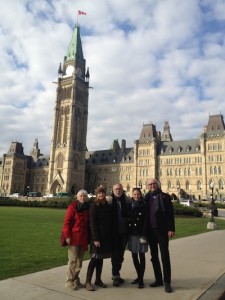 For the past two weeks, the Voices of Victims tour has zigzagged across North America building a groundswell of support for reforming the War on Drugs that has killed over 70,000 people in Mexico.
For the past two weeks, the Voices of Victims tour has zigzagged across North America building a groundswell of support for reforming the War on Drugs that has killed over 70,000 people in Mexico.
Because drug war strategy is driven at its core by decisions made in the U.S., any solution to the violence in Mexico requires participation and deep policy changes in the north, particularly in the areas of our drug and firearms policies. U.S. and Canadian consumers buy more illicit drugs than those in any other country, even as our security policies employ more and more military solutions to stop the flow of drugs.
A year after the Caravan for Peace with Justice and Dignity crossed the country in two big buses, victims of the violence in Mexico, including Mexican poet and activist Javier Sicilia, have again sought to make connections with organizers, immigrants, and victims north of their border. Sicilia and the Movement for Peace with Justice and Dignity have renewed the call for the U.S. and Canada to engage in a serious debate about the future of drug policy, mass incarceration, immigration, and arms and security policies affecting our shared region.
Starting in Denver, Colorado at the Drug Policy Alliance’s annual convention, a large group of Mexican movement members joined the dialogue about marijuana decriminalization adding the important perspective that this is about more than individual liberties but has deep and profound social implications.
Going north to Seattle, WA they were hosted by the ACLU and spent time with law students studying Mexico’s new Victim’s Law and Washington’s 502 initiative, the marijuana reform law from a US and Latin American perspective, exploring what the broader international outcomes of legalization will be.
 In Vancouver they visited InSite, a safe injection site where a public health approach to the drug issue was examined. It is a tiny space, but clean and warm and often the only “indoor” time some of the clients get. Our group was excited to look at the community aspects of Canadian drug policy. Javier joined with another poet and gave a lecture on pain/dolor, searching for the word – that does not exist – to know what to call one’s self when a parent loses a child (not a widower, not a orphan).
In Vancouver they visited InSite, a safe injection site where a public health approach to the drug issue was examined. It is a tiny space, but clean and warm and often the only “indoor” time some of the clients get. Our group was excited to look at the community aspects of Canadian drug policy. Javier joined with another poet and gave a lecture on pain/dolor, searching for the word – that does not exist – to know what to call one’s self when a parent loses a child (not a widower, not a orphan).
A highlight of this 11-city binational tour included a major address hosted by Stanford’s Freeman Spogli Institute where Javier addressed an audience that is used to hearing heads of state pontificate. Grounding his talk in the realities of passing the Victim’s Law in Mexico and putting faces on the statistics of death and disappearance gives urgency to policy decision that must be made.
In Tucson, AZ the Tour visited Operation Streamline at the Evo A. DeConcini Federal Courthouse. The costly, unjust and ineffective “Operation Streamline” program requires criminal prosecution of anyone detained crossing the border without authorization. We watched as approximately 70 people, shackled and chained were steamrolled through the process. This fast track to detention and deportation has mainly affected migrant workers without any criminal history, rather than the drug traffickers the program was stated to target.
 Leaving Tucson, the group headed back to Canada. In Toronto, they participated in a roundtable discussion organized by survivors and victims of gun violence to strategize about effective community responses. In Ottawa, the tour participated in a government briefing with Members of Parliament from the opposition party, the NDP — leaders in foreign affairs, international relations, and healthcare.
Leaving Tucson, the group headed back to Canada. In Toronto, they participated in a roundtable discussion organized by survivors and victims of gun violence to strategize about effective community responses. In Ottawa, the tour participated in a government briefing with Members of Parliament from the opposition party, the NDP — leaders in foreign affairs, international relations, and healthcare.
As Donald MacPherson, Executive Director of the Canadian Drug Policy Coalition, said,
“Javier Sicilia’s visit to Canada is critical in helping Canadians understand that our foreign policy decisions can either help to reduce the violence in Mexico or make things worse. Sicilia is reaching out to Canadians and encouraging us to play a stronger role in helping to stop the devastation that the drug war has caused in Mexico. Canada needs to work with the U.S. and Mexico on alternative approaches to the failed drug war.”
The conversations and connections that have begun are feeding the call for re-thinking policy strategies in all three countries. But we are are only half-way through the tour!
Won’t you help us continue the work of the Voices of Victim’s tour so that we can continue to amplify the conversations and connections that have already begun to rethink drug policy?
Help us complete the tour as we bring the powerful message of bi-national peace, solidarity, and action to activists working for sensible gun legislation in Chicago, immigrants in Los Angeles working to end militarization of the border, policymakers at the Organizations of American States working to bring alternative solutions to the drug policy debate, and advocates in Mississippi working to shift the discussion around mass incarceration of young African-American men in this country and the violence against immigrants and communities of color.
JOIN US ON THE ROAD
Please join us in Washington, DC if you can to meet with representatives from the Organization of American States who have explored four different scenarios for dealing with the issue of drugs in the hemisphere.
November 12, 8:00 – 10:00AM at the Inter-American Commission on Human Rights, Organization of American States
1889 F St NW
Washington, D.C., 20006
The last stop of our tour will be in Jackson, MS for an historic dialogue between Michelle Alexander, author of The New Jim Crow and Javier Sicilia in Jackson MS, making the links again between the mass incarceration of young Black men in this country, the violence against immigrants and in communities of color in this country and how coming together can shift the conversation in important ways. Register for the event.
Get the complete dates of the tour on our website, on-the-road updates on our People-to-People blog, and follow the hashtag #VoicesofVictims13 on Twitter.

